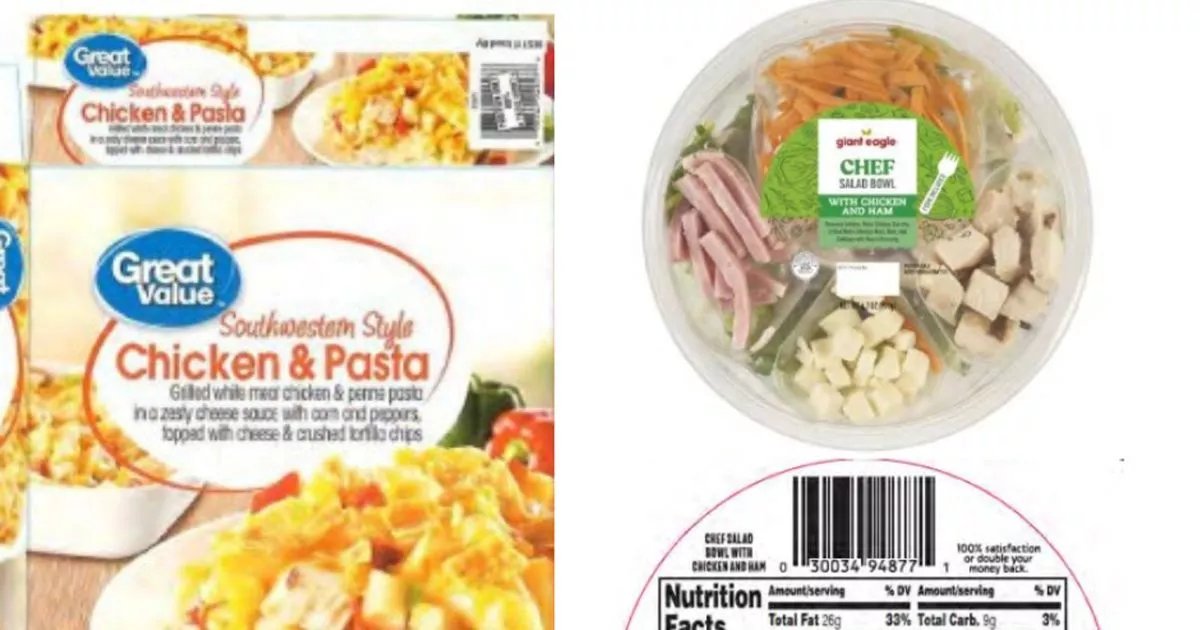10 million pounds of meat recalled by USDA over listeria outbreak linked to popular supermarket products
New fears of a listeria outbreak at factory by a large-scale provider has led the USDA to issue a recall on nearly 10 million pounds of meat and chicken contained in popular salad and frozen meals products and distributed in the largest supermarket chains
12:22 ET, 15 Oct 2024
Beware of any popular chicken products bought this summer, including salads and frozen meals from popular brands, like this one(Image: USDA handout)
The USDA has issued a recall on 9,986,245 pounds of meat, mainly chicken, that is contained in hundreds of popular salad and frozen dinner products that have been sold in supermarkets including Trader Joe’s, Aldi, 7-11, Amazon Go, Kroger, H-E-B, and dozens more.
BrucePac, the Oklahoma establishment that provided the chicken, issued the recall along with the USDA on all foods produced between June 19, 2024, and October 8, 2024, after they found evidence of listeria monocytogenes in the facility. BrucePac adds that no adverse reactions or symptoms of listeria have been reported yet.
Dozens of supermarket chains have sold this product in a variety of forms, prompting the USDA to create a 326-page document listing all the labels being recalled. The product list includes everything from pre-made salads, frozen meals, wraps, microwavable rice bowls and many others that contain chicken.
The USDA recommends checking your freezers for these products and returning them(Image: USDA handout)
Brand names being recalled include Amazon Fresh, Giant Eagle, Bakkavor USA, El Monterey, Trader Joe’s, RAO’s, Marketside, Readymeals, Taylor Farms, H-E-B, Meijer, and more.
The list of affected products is continually being updated, so check back if you suspect that you’ve bought a product that may have been tainted. If you suspect that you’ve bought a tainted product, the USDA suggests either throwing it out or returning it to the place of purchase. Supermarkets that still have a stock of these products are also advised to discard them.
Listeria recalls are common, with Canada facing a large recall on chicken products this summer, though illness is rare. The CDC estimates that 1,600 people are infected with Listeria each year in the United States and 260 people die from the infection on average.
Listeria poses the most significant threat to older adults and individuals with compromised immune systems, according to the CDC. The bacteria can lead to severe invasive infections such as sepsis, meningitis, and meningoencephalitis.
Some people may also experience focal infections, including septic arthritis, osteomyelitis, prosthetic graft infections, and infections of sites inside the chest and abdomen or of the skin and eye. While it’s rare, healthy young individuals can also develop invasive listeriosis.
For many, listeria may present as a stomach bug or, medically speaking, acute febrile gastroenteritis following high-dose Listeria exposure. However, routine stool culture cannot detect the bacteria, meaning you’re unlikely to know you have it unless you’re in a specific outbreak area or symptoms are extremely evident.


